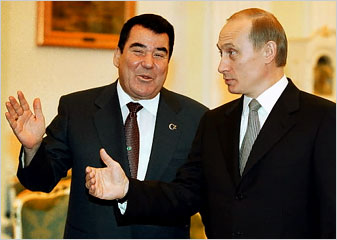
Thursday, December 21, 2006
До свидания! Can we call it January again?
Today, we get news of Turkmenistan, and bid Saparmurat Niyazov a final До свидания! What the future holds for Turkmenistan - and all it's natural resources - is surely likely to be a hot topic of conversation in all our holiday dinner conversations.

Friday, December 15, 2006
"Between Vote and Reality"
But what of the Karabakh Azeris, who were unable to participate on 10 December in deciding the future of Nagorno-Karabakh's internal arrangements? According to international norms, these former inhabitants of Nagorno-Karabakh should not be deprived of their right to participate in the entity's political life.
If Stepanakert wants to be gain legitimacy, it needs to show the international community not only that it can organise orderly and fair referendums, but also that it allows all those who should be eligible to vote to actually cast their ballots. In other words, they must begin to accept the return of the 40,000 Karabakh Azeris who were forced to flee in 1991-92.
That is what I meant to say yesterday; Ms. Freizer said it better.
Thursday, December 14, 2006
Voting madness
 I don't care whether you live in Nagorny Karabakh, Trans-Dniester or South Ossetia, democracy isn't just about majority winning, especially when one side has been "invited" to leave their homes. These elections for independence are a bad side effect of our pre-occupation with voting these days. I am not saying this just 'cause I an Azeri lover who likes khachipuri and Russian pop music.
I don't care whether you live in Nagorny Karabakh, Trans-Dniester or South Ossetia, democracy isn't just about majority winning, especially when one side has been "invited" to leave their homes. These elections for independence are a bad side effect of our pre-occupation with voting these days. I am not saying this just 'cause I an Azeri lover who likes khachipuri and Russian pop music. 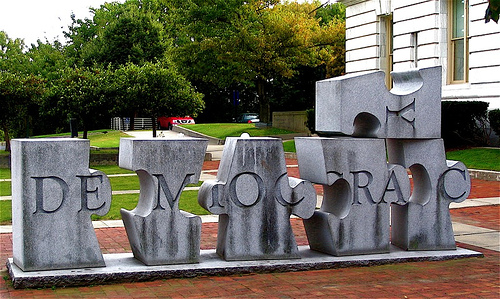 January 21 is an important day, not only for Kosovo, but also for a lot of other places in the world. Can anyone tell me the arguments for Kosovo to be independent?
January 21 is an important day, not only for Kosovo, but also for a lot of other places in the world. Can anyone tell me the arguments for Kosovo to be independent?
Blogging to peak!
I love predictions. I wish I made more of them. Does anyone write letters to oneself in the future? I did it once a camp, but it was only a letter to myself at the end of camp. I think I lost the letter. But if I blogged it...it would be on the internet!
I predict 1) blogger will be around in 2010 and b) even if I move or re-name my blog, I will still be able to link to this very post in 2010!
Predictions about blogging and other stuff:
* The blogging phenomenon is set to peak in 2007 at about 100 million.
* Vista will be the last major release of Windows.
* PCs will halve in cost by 2010.
* By 2010, 60 percent of the worldwide cellular population will be "trackable" via an emerging "follow-me internet."
* By the end of 2007, 75 percent of enterprises will be infected with undetected, financially motivated, targeted malware that evaded their traditional perimeter and host defences.
I want to know how anyone knows how much "undected" malware will be on our computers. Can't we hire the people who know how much malware there is going to be to protect us from malware in the first place?
I predict 1) blogger will be around in 2010 and b) even if I move or re-name my blog, I will still be able to link to this very post in 2010!
Predictions about blogging and other stuff:
* The blogging phenomenon is set to peak in 2007 at about 100 million.
* Vista will be the last major release of Windows.
* PCs will halve in cost by 2010.
* By 2010, 60 percent of the worldwide cellular population will be "trackable" via an emerging "follow-me internet."
* By the end of 2007, 75 percent of enterprises will be infected with undetected, financially motivated, targeted malware that evaded their traditional perimeter and host defences.
I want to know how anyone knows how much "undected" malware will be on our computers. Can't we hire the people who know how much malware there is going to be to protect us from malware in the first place?
Holy shit moments...
Every now and then, something in the media makes me say "holy shit" and today I had one reading a story on Somalia's current and potentially widening conflict.
Holy shit.

Photo by Joao Silva
"I am ready to die," said Osama Abdi Rahim, dressed head to toe in camouflage and marching around with a loaded rifle. He is 7 years old.
Holy shit.

Photo by Joao Silva
Economist: Love it and hate it
I love it because it pushes me to think. I hate it, sometimes, because it is overly simplistic and condescending. Why can't it push one to think without its tone?
Good Food? the leader this week encourages us to get off our socially responsible high horses and consider the unexpected externalities of additional land used in growing organic crops, trade imbalances from fixed fair trade prices and the overall impact of "food miles," not just how close a product was produced. Thank you, we should investigate Rainforest Alliance's efforts to look beyond the guarantee of price.
But...(I am in a bad mood) read the full special report and you realize that the claim of New Zealand lamb, apples and onions being produced with less energy than the same British goods even after the flight to the UK was conducted by...Lincoln University in New Zealand. Wonder how many UK universities cooperated on that research?
And this article on organic cotton might make one think that digging into the issue of organic cotton is only for trend-conscious Prius-owners. OK, economists out there, organic cotton may be hard to certify and difficult to produce, but take a trip to Uzbekistan before you encourage us all to forget about regulating and improving the way global cotton demand is met.
"Ethics, after all, are all the rage."
Stop pissing on everything, you condescending economist jerks.
Good Food? the leader this week encourages us to get off our socially responsible high horses and consider the unexpected externalities of additional land used in growing organic crops, trade imbalances from fixed fair trade prices and the overall impact of "food miles," not just how close a product was produced. Thank you, we should investigate Rainforest Alliance's efforts to look beyond the guarantee of price.
But...(I am in a bad mood) read the full special report and you realize that the claim of New Zealand lamb, apples and onions being produced with less energy than the same British goods even after the flight to the UK was conducted by...Lincoln University in New Zealand. Wonder how many UK universities cooperated on that research?
And this article on organic cotton might make one think that digging into the issue of organic cotton is only for trend-conscious Prius-owners. OK, economists out there, organic cotton may be hard to certify and difficult to produce, but take a trip to Uzbekistan before you encourage us all to forget about regulating and improving the way global cotton demand is met.
"Ethics, after all, are all the rage."
Stop pissing on everything, you condescending economist jerks.
Thursday, November 30, 2006
I needed a little reintermediation today!
Thank you, Designing for Civil Society and David Wilcox, for reminding me I am not alone in the struggle to re-shape the way I wish I could share in my professional life. Your reintermediation has really given me something to ponder.
Wednesday, November 29, 2006
Radical ideas...
I don't look at it often enough, but Foreign Policy is good stuff. I found this article on "What Makes a Muslim Radical?" thoughful and refreshing given the normal truisms we hear about radical Islam. Makes one think, especially the questions about the way forward.
Ask any foreign-policy expert how the West will know it is winning the war on terror, and the likely response will be, "When the Islamic world rejects radicalism." But just who are Muslim radicals, and what fuels their fury? Every politician has a theory: Radicals are religious fundamentalists. They are poor. They are full of hopelessness and hate. But those theories are wrong.
Based on a new Gallup World Poll of more than 9,000 interviews in nine Muslim countries, we find that Muslim radicals have more in common with their moderate brethren than is often assumed. If the West wants to reach the extremists, and empower the moderate Muslim majority, it must first recognize who it's up against.
Monday, November 27, 2006
Visual Griots
My friend Shawn Davis just sent me great story about his work with Malian kids called Visual Griots, which he explains further on his website Shawn Davis Photo.
While somewhat long, I wanted to copy an e-mail he gave me permission to paste here. We need to get this show to London!!! Thanks so much for sharing the details of the evening!

While somewhat long, I wanted to copy an e-mail he gave me permission to paste here. We need to get this show to London!!! Thanks so much for sharing the details of the evening!

Dear friends,
It’s 1:30 in the morning and god only knows when I’ll actually fall asleep. I’m so proud of these kids and truly excited by the reaction of their parents’ generation to their photos that I am really overwhelmed. Tonight was the “soiree culturelle” organized in honor of the children’s photographs by the local NGO that AED partnered with to implement the “Visual Griots”
project in the Tominian region of Mali.
Of course we were all honored yesterday at the dedication ceremony of the new US Embassy here in Bamako, when the US Ambassador asked our students to stand and be recognized before the entire crowd (that included the Prime Minister of Mali) and then eloquently weaved Visual Griots throughout his dedication speech, as an example of a rich and rewarding collaboration between Malians and Americans.
But tonight’s event had a different impact on a very different crowd. It was a cultural evening to celebrate the success of the Visual Griots Project organized for the Bwa population of Bamako by our local NGO partner, Association Vigne. Had I done such a project with kids in my hometown in Vermont, the equivalent would be calling together all of the Vermonters living in Washington, DC to celebrate the pictures taken by the kids in small town Vermont.
The event was held in a community center or “espace culturelle” called “La Cite des Flamboyants” owned by a successful Malian mathematician originally from the same region (Tominian) as the kids we worked with. It was a beautiful outdoor space filled with plastic chairs arranged around a few mango trees and facing a stage where a local band of drummers and guitarists played traditional Bwa music between the evening’s many speeches and presentations. Above the stage was a sign that read in French “Let us all unite.” A perfect theme for this evening that was essentially connecting the villagers to the city folk of the same minority ethnic group and empowering the young villagers to bring the city folks back to their roots! There couldn’t have been two more willing parties.
It was very impressive to see how Association Vigne had leveraged the students’ photographs to raise awareness of the importance of supporting development efforts in the Tominian region, especially in regards to education. They had managed to get their Congressman to attend and speak at the event and even had official representatives from the Office of the President of Mali. All of the kids were introduced, one of them spoke briefly, and then their mayor gave a remarkable speech.
He admitted to us all that when Association Vigne suggested our photography project to them the villages had wondered what impact a bunch of photographs could have, but they thought that with foreigners involved maybe it would bring some money. “Little did we know that money couldn’t buy what this project has brought us,” he said. “These students’ photographs have brought honor upon us. We have been reminded of who we are and what we are capable of. It was an awakening. These youth have drawn the attention of our own President to our region. This is only a beginning. And for the Bwa to be represented in the National Museum of the United States is a big honor for us. And the fact the pictures are hanging in the halls of the new US embassy in Mali we are so honored. We are teaching Americans about Mali and about Africa. Let me tell you how our involvement in the Visual Griots project has already impacted education in the Yasso Commune of which I am mayor. For four years in a row the community school of Damy, a school that is organized by the villagers and maintained by the villagers, failed to present a single student who could pass the sixth grade exam and pass to the second cycle (7th grade) and move to the middle school in Yasso town. Last year, thanks to God, 20 of the 22 students who participated in the Visual Griots project in Damy and Kouara passed the exam and are now traveling from their villages every day to attend the 2nd cycle in the Yasso School. I am also proud to announce that because of this success, we submitted a request to the Malian Ministry of Education to convert the Community School of Damy into a Public School (this means government funding and support) and on October 4th we received official notice that this request was granted. Also, when the Visual Griots team did their workshop at the village school of Kouara there was only a 3-room schoolhouse. Construction is almost finished on two additional rooms for the school, as the number of children being sent by their parents to attend school is rising. I hope that you, the “Tominianers” of Bamako don’t view this evening as a token Bwa folklore event, but as an opportunity to reconnect with the land of your mothers and fathers and to support the development of the area.” (Later in the event they put a big box out into the middle of the dance floor and asked people to donate money to buy books for the school. They raised $234.50!)
Following the mayor’s speech (my personal favorite of the evening) I projected a powerpoint presentation of pictures from the workshop and of the photographs taken by the children, which elicited lots of laughter and applause from the audience. I was lucky enough to end my speech, but saying “And now I will hand over the microphone to his Excellency the President of Mali, Amadou Toumani Toure." And then I played the video clip of his visit to the exhibit of the students’ photos in the Smithsonian, including his outburst of laughter at seeing the photograph of his own election poster with his image, hanging on the wall of the student photograph’s house next to the church calendar and a couple of cowtail fly swatters. Then followed his speech, aimed directly into the journalists’ cameras, and tonight, directly into the crowd of wide-eye children and Tominianers. The President spoke of the immense courage, solidarity, and work ethic of Tominianers and congratulated them on raising their children with these values. He congratulated the children as well on their ability to capture the richness of their culture and to share it with Malians and Americans. He said that the Visual Griots project could have gone into a rich neighborhood in Bamako and come back with pictures of villas and driveways full of fancy cars, but, he added, what would these images truly represent?
At the end of the evening (in an attempt at brevity I’m skipping the part where I was not only presented with a traditional handspun cotton Bwa tunic, but dressed in it and asked to dance with the whole crowd) one of the Bamako Tominianers drove me back to my hotel in his Mercedes. “You know what ATT (their abbreviation for the President of Mali) said about the villa and the fancy car?” he said to me. “I live in one of those villas and I’m driving you to your hotel in one of those fancy cars, but I come from the place where those children’s photos were taken. I can’t walk away from seeing those photos and listening to our President . . . and not begin to think about doing something myself for my village. We the professional Tominianers in Bamako can now “faire la politique” (lobby?) so that maybe even a road can be constructed that will further the development of the region.”
This night was full of such encounters. Sure, talk is talk, but people were bursting with pride at being Bwa, they were talking to each other and lifting each other up, and it won't surprise me if it leads to other developments. I’ve never felt so lucky to be part of such a project. Honestly, tonight was probably the most fulfilling moment yet on this long road. You ask yourself all along the way about the real impact that the project will have and then you end with a night like tonight.
Benjamin Diarra, one of the older men from the school administration that helped us during the workshop back in 2005 told me tonight, “Shawn, little by little a bird builds its nest. But the bird must keep being a bird because that’s what he is. If the bird tries to be something it isn’t, if it tries to pass itself off as a frog ie’s never going to finish it's nest. So keep being yourself and working on this project and pretty soon you’ll find that you’ve built a nest and that its full of eggs.”
I'm going to sleep on that now. It's 2:50 a.m!
-Shawn
Tuesday, November 21, 2006
Africa man, original?
Preaching Free-Market Gospel to Skeptical Africa was a thought-provoking read. I suppose this debate has been reviewed for decades. But this time, I thought it was interesting that it was in the National section of the New York Times and that is again framed only as one or the other - business or charity/aid.
I wish we could get somewhere in the middle where we listen to the points Mr. Shikwati is making without seeing him as a pawn of the evil capitalist. In the same light, I wish short-sighted fiscal conservatives would stop using people like this to avoid addressing the short-comings of markets.
Sachs falls into a defensive trap yet again, which isn't helpful. Reed stikes me as a ideologue, which isn't helpful either. I think the Sachs could make headway against the ideologues of the world if they considered the criticism of the Shikwati's a bit more thoughtfully.
I wish we could get somewhere in the middle where we listen to the points Mr. Shikwati is making without seeing him as a pawn of the evil capitalist. In the same light, I wish short-sighted fiscal conservatives would stop using people like this to avoid addressing the short-comings of markets.
Sachs falls into a defensive trap yet again, which isn't helpful. Reed stikes me as a ideologue, which isn't helpful either. I think the Sachs could make headway against the ideologues of the world if they considered the criticism of the Shikwati's a bit more thoughtfully.
Mining my own business?
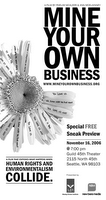
Mine Your Own Business will be hugely controversial as it makes us all think about the unintended consequences of blindly supporting environmentalist campaigns across the globe. It is a challenge to the green groupthink that allows westerners to deny progress to those who need it most.
Controversial indeed. For example, who would you select to play the evil environmentalist in this film?
Thursday, November 16, 2006
Going in development circles
This World Resources Institute post on Oxfam's latest report about Health, Water and Sanitation for All made me again ask myself if I think it's OK to charge for basic services such as water and basic health care.
Yes, it is OK, I think, and sometimes desirable. In places where the basic structure of tax collection and service provision do not work, you have to think outside the box and I think WRI and other blogs are pushing me to think more about well regulated business as a means to innovate and solve problems. Clearly, that shouldn’t open the flood gates to companies making a killing with basic services, but this question has to get beyond the "right" for everyone to have...health, water and sanitation. In theory, I think everyone should have these things, but it just isn't that easy. This kind of provision, if unregulated, leads to other sorts of exploitation. Certainly free aid is often diverted into commercial markets and I have heard stories of many hospitals charging just so the health workers can feed their own families. Keeping that in the shadows is like poison as the poor still don't get what they need and people who are just trying to get by end up being labeled corrupt.
What is harder to regulate, businesses with the potential to exploit or non-profits with the potential to give too much away and mix up the incentive structures? All in the tedious details, right?
I am going to read the Unilever case study from Indonesia. They were often mentioned in C. K. Prahalad's Fortune at the Bottom of the Pyramid.
Anyone with insight on this?!
Yes, it is OK, I think, and sometimes desirable. In places where the basic structure of tax collection and service provision do not work, you have to think outside the box and I think WRI and other blogs are pushing me to think more about well regulated business as a means to innovate and solve problems. Clearly, that shouldn’t open the flood gates to companies making a killing with basic services, but this question has to get beyond the "right" for everyone to have...health, water and sanitation. In theory, I think everyone should have these things, but it just isn't that easy. This kind of provision, if unregulated, leads to other sorts of exploitation. Certainly free aid is often diverted into commercial markets and I have heard stories of many hospitals charging just so the health workers can feed their own families. Keeping that in the shadows is like poison as the poor still don't get what they need and people who are just trying to get by end up being labeled corrupt.
What is harder to regulate, businesses with the potential to exploit or non-profits with the potential to give too much away and mix up the incentive structures? All in the tedious details, right?
I am going to read the Unilever case study from Indonesia. They were often mentioned in C. K. Prahalad's Fortune at the Bottom of the Pyramid.
Anyone with insight on this?!
Wednesday, November 08, 2006
Saturday, October 28, 2006
"Social enterprise" in a rut
The Financial Times can't even tell us how to define social enterprise. Last week's article, When the good struggle to be great just recycles what seems like the edge of the discussion - Interesting idea, hard to define and isn't is good people are being entrepreneurial. I personally think this confusion between social enterprise and social entrepreneur, re-told in the article, is unhelpful. One is a legal structure, the other is a person who may or may not work for a legal structure called a social enterprise. As much as I admire their ideals, Ashoka is only loosely related to social enterprise.
It would be nice to hear new ideas about how the concept of Community Interest Companies has progressed.
It would be nice to hear new ideas about how the concept of Community Interest Companies has progressed.
Thursday, October 26, 2006
Clear cutting, carbon confusion
 I continue to venture into the world of "sustainable development" and all that it entails. World Business Council for Sustainable Development has some good stuff on their different rss feeds. But...
I continue to venture into the world of "sustainable development" and all that it entails. World Business Council for Sustainable Development has some good stuff on their different rss feeds. But...Today I learned that while some tell me that bio fuels are good (which I sometimes promote, clearly without doing all my homework), the experience of Brazil raises questions about their potential negative environmental consequences. And...
Soy, the main raw material for biodiesel in Brazil, due to its massive current production, "has already become one of the principal factors behind deforestation of the Amazon and the Cerrado, a biome of savannahs and scrub forests that covers the extensive central area of Brazil," said the expert.
All this confirmed by another article, where the World Bank is telling us that the main driver of deforestation is the consumption of cheap beef, soya, lumber and other products by the rich countries of the North.
Hold the tofu.
Oh yeah, that article tells me the answer to all these problems is..."a carbon-trading forest conservation network," which is confirmed by another article claiming that global forests are disappearing for a pittance and Kyoto is the answer.
Clearly I am not getting too many answers from my exploration of this website. Let's ask the academic in my house...
Alberto says, "the important things to remember are environmental narratives and social constructivism, which teach us that it's not about what these articles say, but who is talking and why." He's clearly smart, but as a professionally and personally interested person, today I can understand why some people just can't be bothered.
Tuesday, October 24, 2006
'You Internalize It in Your Gut'
Huge congratulations to Millie Ravenel, director of University of North Carolina's Center for International Understanding, and her colleagues for re-prooving one of the most underutilized tools of social change: socializing! Travel to listen, learn and try to see things from the other side.
There are two great pieces featured on National Public Radio on the way Americans on both sides of the immigration debate had transformative experiences when they took a week-long trip to Mexico to better understand why people actually immigrate to the US.
I think this process has profound potential. It always has. As a former Peace Corps volunteer from Russia who grew up in the 80s under the nuclear-armed thumbs of Reagan and Gorbachev, I too had some serious "aha" moments when I met my peers from the "evil empire."
Taking it one step further, how about a study tour to Egypt, Saudi Arabia or even Iran for Americans? Every Westerner I know who's been there says they felt Iran was one of the friendliest countries they have ever visited. Why not?!?!
There are two great pieces featured on National Public Radio on the way Americans on both sides of the immigration debate had transformative experiences when they took a week-long trip to Mexico to better understand why people actually immigrate to the US.
I think this process has profound potential. It always has. As a former Peace Corps volunteer from Russia who grew up in the 80s under the nuclear-armed thumbs of Reagan and Gorbachev, I too had some serious "aha" moments when I met my peers from the "evil empire."
Taking it one step further, how about a study tour to Egypt, Saudi Arabia or even Iran for Americans? Every Westerner I know who's been there says they felt Iran was one of the friendliest countries they have ever visited. Why not?!?!
Sunday, October 22, 2006
Diamond CSR, or not...
NPR's piece on the up coming movie "Blood Diamond" reminded me of a recent website created by the diamond industry, Diamond Facts. I admit it is poorly named, particularly since the "facts" are "sourced from" the likes of De Beers Group and the Gem and Jewellery Export Promotion Council. Why don't they attribute a fact to its direct source?
What I appreciate about the Diamond Facts website is that it does help people understand some of the issues at stake. It doesn't mean consumers should be any less vigilant and I certainly question some of their sourced facts from the diamond industry. But at least one can learn about the Kimberly process. I do think the companies are in a tough spot as they working in extremely difficult political environments.
But why didn't Diamond Facts have a link to Global Witness?
Read this gripping story on Diamonds, children and witchcraft and if you think Diamond Facts might need a slight change in it's presentation. Also another BBC story from the Central African Republic.
What I appreciate about the Diamond Facts website is that it does help people understand some of the issues at stake. It doesn't mean consumers should be any less vigilant and I certainly question some of their sourced facts from the diamond industry. But at least one can learn about the Kimberly process. I do think the companies are in a tough spot as they working in extremely difficult political environments.
But why didn't Diamond Facts have a link to Global Witness?
Read this gripping story on Diamonds, children and witchcraft and if you think Diamond Facts might need a slight change in it's presentation. Also another BBC story from the Central African Republic.
Saturday, September 16, 2006
Un-sustained blogging to change!
Well, blogging hasn't been my forte in recent weeks. Time to renew efforts, blah, blah, blah...
I have taken on new work in the realm of "sustainable" development. Much to learn, but still closely linked to the ideas I have been thinking about. One recent article I was reading made a sharp observation: "The truth is that sustainability implies something quite different depending on which wide of the bulldozer you are on."
Approaching my work with healthy skepticism, I have also recently enjoyed a nice story for kids...about development and destroying cultures in the name of development. Kids grow up quickly these days.
Enjoy There You Go! from Survival International.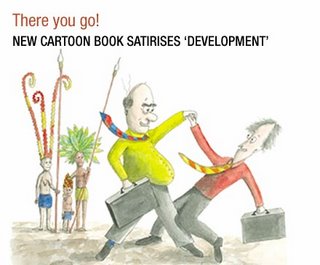
I have taken on new work in the realm of "sustainable" development. Much to learn, but still closely linked to the ideas I have been thinking about. One recent article I was reading made a sharp observation: "The truth is that sustainability implies something quite different depending on which wide of the bulldozer you are on."
Approaching my work with healthy skepticism, I have also recently enjoyed a nice story for kids...about development and destroying cultures in the name of development. Kids grow up quickly these days.
Enjoy There You Go! from Survival International.

Tuesday, June 13, 2006
Peer to peer development
In case one hasn't read the story of Kiva yet, there is a good interview on the World Resources Institue website about this innovative peer-to-peer microloan program.
The Kiva model pushes the imagination and makes me wonder if it would be possible to do more to maintain and strengthen connections beyond just giving a loan. My favorite "connection" recently has been the Nata Village Blog, which I follow regularly.
Going forward, we believe that facilitating connections is going to be our "bread and butter", so we are trying to create software, a platform which will continuously create those synergies without us getting much involved. We don't want to create the connection or manage the connections, we want to facilitate them and then get out of the way.
The Kiva model pushes the imagination and makes me wonder if it would be possible to do more to maintain and strengthen connections beyond just giving a loan. My favorite "connection" recently has been the Nata Village Blog, which I follow regularly.
Friday, May 26, 2006
Easterly versus Sachs (and Bono)
I have been meaning to write something (and compile links) on the recent debate about international development between William Easterly and Jeffery Sachs.
With that, you have the basic questions Easterly is posing to Sachs and development practitioners.
I will not hide my bias. I largely agree with Easterly's opinion that Sachs is overly interested in "poverty traps" and increasing aid levels in order to duplicate his model villages. But I would prefer if these economists worked together. Tragically, the problems they want to solve have no easy answers and some have misused critical analysis to oversimplify and sensationalize and difficult issues. (See this horrible clip from ABC news.)
For a concise overview of Easterly's book, The White Man's Burden, I recommend the online exchanges hosted by the Cato Institute and Easterly's own website, which links to many of the book's reviews, good and bad. If you only have time for one review, Amartya Sen's is especially thoughtful, as is Easterly's response.
I think Easterly is bringing up some crucial problems in the way international development is framed and presented. I applaud Sachs and Bono for raising awareness about global poverty, but I just do not think development happens with more money and we certainly can't spend away poverty as Bono's Red campaign is encouraging us to do. I am thrilled Bono's work will raise cash for the Global Fund to Fight AIDS, Tuberculosis and Malaria, but it doesn't engage sufficiently with the issues Easterly is bringing to our attention.
 What I most appreciate about Easterly's book is his emphasis on the incentives making development work (or not). The challenge of incentives struck me again on Sunday while reading the newspaper. On page 26 was a story about Bono’s tour of Southern Africa. On page 34 was a story about the exodus of Kenyan nurses to Europe and the US. Their search for a better life has left many hospitals in a staffing crisis. Bono's trip may increase the likelihood that more people will give to the Global Fund. But it is the small and serious problems (like fleeing nurses) that are not being addressed by our spending sprees, even if world governments cough up as much money as they promise.
What I most appreciate about Easterly's book is his emphasis on the incentives making development work (or not). The challenge of incentives struck me again on Sunday while reading the newspaper. On page 26 was a story about Bono’s tour of Southern Africa. On page 34 was a story about the exodus of Kenyan nurses to Europe and the US. Their search for a better life has left many hospitals in a staffing crisis. Bono's trip may increase the likelihood that more people will give to the Global Fund. But it is the small and serious problems (like fleeing nurses) that are not being addressed by our spending sprees, even if world governments cough up as much money as they promise.
After $2.3 trillion over 5 decades, why are the desperate needs of the world's poor still so tragically unmet? Isn't it finally time for an end to the impunity of foreign aid?
With that, you have the basic questions Easterly is posing to Sachs and development practitioners.
I will not hide my bias. I largely agree with Easterly's opinion that Sachs is overly interested in "poverty traps" and increasing aid levels in order to duplicate his model villages. But I would prefer if these economists worked together. Tragically, the problems they want to solve have no easy answers and some have misused critical analysis to oversimplify and sensationalize and difficult issues. (See this horrible clip from ABC news.)
For a concise overview of Easterly's book, The White Man's Burden, I recommend the online exchanges hosted by the Cato Institute and Easterly's own website, which links to many of the book's reviews, good and bad. If you only have time for one review, Amartya Sen's is especially thoughtful, as is Easterly's response.
I think Easterly is bringing up some crucial problems in the way international development is framed and presented. I applaud Sachs and Bono for raising awareness about global poverty, but I just do not think development happens with more money and we certainly can't spend away poverty as Bono's Red campaign is encouraging us to do. I am thrilled Bono's work will raise cash for the Global Fund to Fight AIDS, Tuberculosis and Malaria, but it doesn't engage sufficiently with the issues Easterly is bringing to our attention.
 What I most appreciate about Easterly's book is his emphasis on the incentives making development work (or not). The challenge of incentives struck me again on Sunday while reading the newspaper. On page 26 was a story about Bono’s tour of Southern Africa. On page 34 was a story about the exodus of Kenyan nurses to Europe and the US. Their search for a better life has left many hospitals in a staffing crisis. Bono's trip may increase the likelihood that more people will give to the Global Fund. But it is the small and serious problems (like fleeing nurses) that are not being addressed by our spending sprees, even if world governments cough up as much money as they promise.
What I most appreciate about Easterly's book is his emphasis on the incentives making development work (or not). The challenge of incentives struck me again on Sunday while reading the newspaper. On page 26 was a story about Bono’s tour of Southern Africa. On page 34 was a story about the exodus of Kenyan nurses to Europe and the US. Their search for a better life has left many hospitals in a staffing crisis. Bono's trip may increase the likelihood that more people will give to the Global Fund. But it is the small and serious problems (like fleeing nurses) that are not being addressed by our spending sprees, even if world governments cough up as much money as they promise.
Monday, May 15, 2006
All information, all the time.
Great read in the NY Times magazine on books, networks and the future of it all. Here!
As someone who just received The Complete New Yorker for Christmas, a gift that allowed me to purge my hardcopy storage of back issues, I love this idea in theory. But, honestly, having it on my computer is not the same as taking a copy to the park. Flipping through pages still has an appeal to me. Making notes in the margins that I will discover, unexpectedly, years later ensures a future surprise. I know the interface is trying to duplicate these simple pleasures, but I am not sold yet even if I feel like I am swimming against the unyielding current of change.
 And I can't help but think of Winston Smith, protagonist from 1984 (available online, of course). What happens when someone begins to control or tamper with this digital library?
And I can't help but think of Winston Smith, protagonist from 1984 (available online, of course). What happens when someone begins to control or tamper with this digital library?
And I can't help but wonder about...let's call them... "misconceptions" that are written down? Will all information, all the time and all at the click of a button push forward the negotiating process in the Middle East or other historical mine fields? I guess disputes will generate this message: The neutrality and factual accuracy of this article are disputed.
And a million other questions too!
Kevin Kelly's conclusion: "In the clash between the conventions of the book and the protocols of the screen, the screen will prevail."
To be continued...
Technorati Tags: Socialsoftware
From the days of Sumerian clay tablets till now, humans have "published" at least 32 million books, 750 million articles and essays, 25 million songs, 500 million images, 500,000 movies, 3 million videos, TV shows and short films and 100 billion public Web pages. All this material is currently contained in all the libraries and archives of the world. When fully digitized, the whole lot could be compressed (at current technological rates) onto 50 petabyte hard disks. Today you need a building about the size of a small-town library to house 50 petabytes. With tomorrow's technology, it will all fit onto your iPod. When that happens, the library of all libraries will ride in your purse or wallet — if it doesn't plug directly into your brain with thin white cords. Some people alive today are surely hoping that they die before such things happen, and others, mostly the young, want to know what's taking so long. (Could we get it up and running by next week? They have a history project due.)
As someone who just received The Complete New Yorker for Christmas, a gift that allowed me to purge my hardcopy storage of back issues, I love this idea in theory. But, honestly, having it on my computer is not the same as taking a copy to the park. Flipping through pages still has an appeal to me. Making notes in the margins that I will discover, unexpectedly, years later ensures a future surprise. I know the interface is trying to duplicate these simple pleasures, but I am not sold yet even if I feel like I am swimming against the unyielding current of change.
 And I can't help but think of Winston Smith, protagonist from 1984 (available online, of course). What happens when someone begins to control or tamper with this digital library?
And I can't help but think of Winston Smith, protagonist from 1984 (available online, of course). What happens when someone begins to control or tamper with this digital library? And I can't help but wonder about...let's call them... "misconceptions" that are written down? Will all information, all the time and all at the click of a button push forward the negotiating process in the Middle East or other historical mine fields? I guess disputes will generate this message: The neutrality and factual accuracy of this article are disputed.
And a million other questions too!
Kevin Kelly's conclusion: "In the clash between the conventions of the book and the protocols of the screen, the screen will prevail."
To be continued...
Technorati Tags: Socialsoftware
Saturday, May 13, 2006
Friday, May 12, 2006
(Bad) democracy rising!
This is thought-provoking stuff. Open Democracy gives a monthly bad democracy award. I am entertained by this month's options since there are two leaders this month from the areas I have worked in recently (the South Caucasus). I thought Misha Saakashvili was the leader of the Rose Revolution, which is supposed to be a shinning example of all that's going well in the region. Who can you trust these days?
Be honest and only vote once!
Be honest and only vote once!
Tuesday, May 09, 2006
A sharp CSR debate!
Whole Foods has reprinted a Reason Online double-team on its CEO John Mackey by Nobel laureate Milton Friedman and Cypress Semiconductor's T. J. Rodgers. The topic is corporate social responsibility and a whole lot more.
These gentlemen are way smarter than I will ever be, but the exchange (at least the one between Mackey and Friedman) seems to be a rhetorical argument where there are simply hard-to-quantify intangibles like purchasing goodwill and consumer loyalty. Whole Foods pays an arbitrary 5% of profits on certain days throughout the year. Mackey calls it social responsibility and Friedman, I think, calls it self-interest. I call it "enlightened self-interest" and I would like to see it grow.
I don't appreciate T. J. Rogers tone. He seems to forget that corporations can export externalities and costs that investors can't see. Yes, a bank that practices predatory lending to low-income areas, a gun company that sells assault weapons abroad in war-torn hell holes and oil companies that fight efforts to increase fuel-efficiency may be upstanding corporate leaders making high return on investment within the law, but the costs of their trade hurt.
In my humble, humble opinion, Mackey wins the debate!
These gentlemen are way smarter than I will ever be, but the exchange (at least the one between Mackey and Friedman) seems to be a rhetorical argument where there are simply hard-to-quantify intangibles like purchasing goodwill and consumer loyalty. Whole Foods pays an arbitrary 5% of profits on certain days throughout the year. Mackey calls it social responsibility and Friedman, I think, calls it self-interest. I call it "enlightened self-interest" and I would like to see it grow.
I don't appreciate T. J. Rogers tone. He seems to forget that corporations can export externalities and costs that investors can't see. Yes, a bank that practices predatory lending to low-income areas, a gun company that sells assault weapons abroad in war-torn hell holes and oil companies that fight efforts to increase fuel-efficiency may be upstanding corporate leaders making high return on investment within the law, but the costs of their trade hurt.
In my humble, humble opinion, Mackey wins the debate!
Wednesday, May 03, 2006
Social (journalism) enterprise, I guess...
In an effort to understand the UK's concept of "social enterprise" - a business with primarily social objectives whose surplus is principally reinvested for that purpose in the business or in the community, rather than being driven by the need to maximize profit for shareholders and owners. (Social Enterprise - A Strategy for Success, DTI, 2002) - I heard an interesting piece on NPR about a newspaper in Alabama.
The word social enterprise isn't used in the story. The publisher wants to create a not-for-profit and the "earnings will be used to run the paper, and its dividends will help pay the cost of teaching the students."
I have two main questions: 1) Is it necessary to create the organizational distinction for "social enterprise" or, the new legal term, Community Interest Companies (CICS)? It doesn't seem to be an active debate in the US. 2) Is this a dying hope that an enterprise can survive with the added social benefit (or business cost) of working with less experienced professionals?
There seems to be something the UK is trying to develop by promoting CICS that goes beyond the traditional non- and for-profit models.
It is the duty of a newspaper to become the attorney for the most defenseless among its subscribers. 'Anniston Star' philosophy, Col Harry M. Ayers
I hope they succeed. Haven't heard this kind of sentiment for a long time...
The word social enterprise isn't used in the story. The publisher wants to create a not-for-profit and the "earnings will be used to run the paper, and its dividends will help pay the cost of teaching the students."
I have two main questions: 1) Is it necessary to create the organizational distinction for "social enterprise" or, the new legal term, Community Interest Companies (CICS)? It doesn't seem to be an active debate in the US. 2) Is this a dying hope that an enterprise can survive with the added social benefit (or business cost) of working with less experienced professionals?
There seems to be something the UK is trying to develop by promoting CICS that goes beyond the traditional non- and for-profit models.
It is the duty of a newspaper to become the attorney for the most defenseless among its subscribers. 'Anniston Star' philosophy, Col Harry M. Ayers
I hope they succeed. Haven't heard this kind of sentiment for a long time...
Monday, May 01, 2006
Fancy a blog?
Does fully embracing the 21st century mean having a blog of one's own? NPR's Scott Simon seems to think his would be boring because he's short of time. He better find the time, 'cause to be truly 21st century, he needs to write about eight blogs, read about .0001% of the 30 Million out there and keep his MySpace profile hip, cool and super sexy. He doesn't even seem to have a MySpace profile yet.
How long will newspapers write this story? How long will I blog about it?
How long will newspapers write this story? How long will I blog about it?
Sunday, April 30, 2006
Critical dissident
 I am trying to pay more attention to Russia and did a double take reading a Guardian piece on Alexander Solzhenitsyn. I have tended to find the former-dissident and writer a bit too apologetic on Russia's slide toward illiberal democracy. But a passage made me think:
I am trying to pay more attention to Russia and did a double take reading a Guardian piece on Alexander Solzhenitsyn. I have tended to find the former-dissident and writer a bit too apologetic on Russia's slide toward illiberal democracy. But a passage made me think:At a time when American and European officials are repeatedly questioning Mr Putin's commitment to democracy, Solzhenitsyn said: "Present-day western democracy is in a serious state of crisis." He said Russia should not "thoughtlessly imitate" these democracies but look after its own people.
He might be on to something...
Yesterday's interview touched on a burning issue in Russia, that of the growing xenophobia that has led to dozens of attacks on foreigners so far this month, at least six of which were fatal. He warned against condemning all nationalism: a little was needed, he said, to stop ethnic Russians from dying out.
For me, Solzhenitsyn's observations are a reminder of why being consistent matters. As the article highlights, the West's support of democracy in Russia and the Newly Independent States was inconsistent at the very best. I see a connection between his (self-) defense of Russia and various current geopolitical policy debates. Too much moralizing about democracy without consistent action leads many to mistrust...or worse.
Wouldn't it be good if one of the bravest voices against oppression was on "our" side?
More thoughts on the "hypocrisy of international allegiances" and why you punish Belarus, lunch with Azerbaijan and bring out the pipers and drummers for China from Friday's Guardian.
Monday, April 24, 2006
Who you tryin' to fool?
While I missed it when it first came out, The Economist survey on corporate social responsibility from Jan. 2005 is useful for telling us that just because a company uses do gooding language doesn't mean they do good. And there is some useful distinctions between irresponsible corporate PR tricks and genuine philanthropy. Certainly, CSR gets used for lots of dubious reasons. But do they really expect me to believe this statement?
The survey would have us believe that pursuit of profit and adherence to existing legal and regulatory frameworks is enough. This totally ignores the problem of collective action and the influential power of corporate giants to manipulate those of us with limited time to understand what's really happening.
I have found past articles from the Stanford Social Innovation Review more enlightening about the debate. The Myth of CSR highlights the weaknesses without making us think responsible business is only for naive idealists and Changing the Game provides some convincing examples of how doing more can be smart for business. I like to think there is a growing market for responsible business, even if it makes me a naive idealist.
I think these issues are challenging and timely. New campaigns like Product RED are encouraging us to consume to help fight HIV. It seems to raise awareness and generate funds for a good cause, but I begin to worry when we think we can consume ourselves out of social problems.
By and large, the world is not running out of resources; where it is, prices reflect that fact. As a result, the ordinary pursuit of profits is an excellent guide to companies on whether to recycle.
The survey would have us believe that pursuit of profit and adherence to existing legal and regulatory frameworks is enough. This totally ignores the problem of collective action and the influential power of corporate giants to manipulate those of us with limited time to understand what's really happening.
I have found past articles from the Stanford Social Innovation Review more enlightening about the debate. The Myth of CSR highlights the weaknesses without making us think responsible business is only for naive idealists and Changing the Game provides some convincing examples of how doing more can be smart for business. I like to think there is a growing market for responsible business, even if it makes me a naive idealist.
I think these issues are challenging and timely. New campaigns like Product RED are encouraging us to consume to help fight HIV. It seems to raise awareness and generate funds for a good cause, but I begin to worry when we think we can consume ourselves out of social problems.
Thursday, April 06, 2006
Check out the latest blog
RSS feeds and other cool tools in the Web 2.0 world have a way of both empowering and diluting any sense of power I may sometimes feel. With RSS, I can monitor headlines from everywhere, yet after a few articles here, a blog there and a few more headlines for good measure, and I feel like I haven't gotten anywhere, mostly since each online story leads down another path to new blogs that I was a fool for missing until today. Growing pains of an Internet user, I guess. I don't quite recall feeling this way when I didn't read the newspaper every morning.
Foreign Policy started a new blog a few days ago. It seems great that now I can be privy to "arguments hashed out at the coffee machine, editors' insights on the news, story tips buried on their desks, things they hear from their friends abroad, and interesting links that circulated through their inboxes."
High speed Internet allows me to listen to my favorite NPR news shows online throughout my London flat and more and more shows are interviewing personalities from the blogging world. Almost daily I am informed about another blog site that's independent, dynamic and all the rage. Is there no end? Isn't this the beauty of the new technology? There is no end! But what I am finding is that many sites are following a similar pattern with similar ideas.
I want a cool tool that knows me intimately, knows my sense of humor and my passions. A tool that can tell what I am curious about and then gives me a nice, neatly edited page with the things I need to know. I think this tool must be locked in my brain somewhere. If only I could find it!
Foreign Policy started a new blog a few days ago. It seems great that now I can be privy to "arguments hashed out at the coffee machine, editors' insights on the news, story tips buried on their desks, things they hear from their friends abroad, and interesting links that circulated through their inboxes."
High speed Internet allows me to listen to my favorite NPR news shows online throughout my London flat and more and more shows are interviewing personalities from the blogging world. Almost daily I am informed about another blog site that's independent, dynamic and all the rage. Is there no end? Isn't this the beauty of the new technology? There is no end! But what I am finding is that many sites are following a similar pattern with similar ideas.
I want a cool tool that knows me intimately, knows my sense of humor and my passions. A tool that can tell what I am curious about and then gives me a nice, neatly edited page with the things I need to know. I think this tool must be locked in my brain somewhere. If only I could find it!
Saturday, March 25, 2006
Thursday, March 23, 2006
Enlightened self-interest?
 A few days ago the Body Shop was sucked up by L’Oreal and now, literally closer to my home, Tom's of Maine has been bought by Colgate-Palmolive. Is this a defeat in the battle between wicked corporations and socially responsible businesses or a positive trend that highlights the growth of enlightened self-interest, where big businesses are learning that do gooding matters for profits and people? I am going to pay attention.
A few days ago the Body Shop was sucked up by L’Oreal and now, literally closer to my home, Tom's of Maine has been bought by Colgate-Palmolive. Is this a defeat in the battle between wicked corporations and socially responsible businesses or a positive trend that highlights the growth of enlightened self-interest, where big businesses are learning that do gooding matters for profits and people? I am going to pay attention.I like the term "enlightened self-interest," which first resonated with me while watching a BBC documentary on the Africa Live concert to fight Malaria. (Very good concert and film!) The documentary showed an interview with a representative of ExxonMobil, one of the main funders of the event. He was pretty inarticulate and awkward and many people watching the film groaned in cynicism. But commentary by one of the film makers after the movie highlighted that in today's world, we may scoff at ExxonMobil for being involved in such a campaign, but that the ExxonMobil employee's "enlightened self interest might be the best we get."
I tend to agree.
Tuesday, March 21, 2006
So much for expanding my mind...
Let's not hide it. I'm generally on the left-ish side of the political fence. But in an effort to be open minded and read diverse magazines, I signed up for the newsletter from the Weekly Standard. I just got my first e-mail and read their featured article, It's Hard Out Here for an Iraqi, which, I think, was trying to challenge the view that Guantanamo Bay is causing increased hatred for the US.
The article contains long and odd excerpts from the tribunal proceedings of this disturbed guy with some issues around his sexuality and his "small penis." He also has tendency to say "fuck" a lot and clearly had some financial issues. In short, he seems very confused and, according the author, Thomas Joscelyn, is by "no means typical."
So, what should I take from this?
In the author's conclusion: "There is no hint of Ali's fate in the transcript. The tribunal board continually reiterates that it doesn't have the power to make an immediate decision. For all of Ali's troubles, he says, he would like to be freed and serve America. If the U.S. military won't take him, there's always hip-hop. Or Yale."
So, in 5,000 pages of tribunal proceedings, this writer finds a guy in Guantanamo Bay who has huge personal issues with his sexuality and family, who doesn't support the former Iraqi regime or the Taliban and wants to "serve America." Does that mean I should stop questioning the human rights implications of detaining people with no charge for four years?
And they feature this article on their listserv?
Pass me a copy of The Nation, please!
The article contains long and odd excerpts from the tribunal proceedings of this disturbed guy with some issues around his sexuality and his "small penis." He also has tendency to say "fuck" a lot and clearly had some financial issues. In short, he seems very confused and, according the author, Thomas Joscelyn, is by "no means typical."
So, what should I take from this?
In the author's conclusion: "There is no hint of Ali's fate in the transcript. The tribunal board continually reiterates that it doesn't have the power to make an immediate decision. For all of Ali's troubles, he says, he would like to be freed and serve America. If the U.S. military won't take him, there's always hip-hop. Or Yale."
So, in 5,000 pages of tribunal proceedings, this writer finds a guy in Guantanamo Bay who has huge personal issues with his sexuality and family, who doesn't support the former Iraqi regime or the Taliban and wants to "serve America." Does that mean I should stop questioning the human rights implications of detaining people with no charge for four years?
And they feature this article on their listserv?
Pass me a copy of The Nation, please!
Monday, March 13, 2006
Blindspot: Peter Drucker
As a humble, humble student, I enjoy coming upon blind spots in things I think I should have heard about and have totally missed. Peter Drucker is certainly a good example. I just read my first article today, mostly because, for some reason, many articles and books I have been reading over the past few weeks tends to quote and reference him...a lot! (No, I never took a management class, but there should have been lots of cross-over in my public policy MA.) He was rather prolific, so I better keep reading.
As one who digs into the terminology of the nonprofit/third/volunteer/civic sector, I found his description of the "social sector" in the The Age of Social Transformation (first published in The Atlantic Monthly, November 1994) to be something easily digestible.
I will not touch that comment about the product of a churchgoer, but I take issue...
The concept of well being, while squishy, is something I hear more and more about. I think I will come back to "well being."
If anyone has thoughts on, arguments for/against or general insight into Drucker, do share.
As one who digs into the terminology of the nonprofit/third/volunteer/civic sector, I found his description of the "social sector" in the The Age of Social Transformation (first published in The Atlantic Monthly, November 1994) to be something easily digestible.
We still talk of these organizations as "nonprofits." But this is a legal term. It means nothing except that under American law these organizations do not pay taxes. Whether they are organized as nonprofit or not is actually irrelevant to their function and behavior. Many American hospitals since 1960 or 1970 have become "for-profits" and are organized in what legally are business corporations. They function in exactly the same way as traditional "nonprofit" hospitals. What matters is not the legal basis but that the social-sector institutions have a particular kind of purpose. Government demands compliance; it makes rules and enforces them. Business expects to be paid; it supplies. Social-sector institutions aim at changing the human being. The "product" of a school is the student who has learned something. The "product" of a hospital is a cured patient. The "product" of a church is a churchgoer whose life is being changed. The task of social-sector organizations is to create human health and well being.
I will not touch that comment about the product of a churchgoer, but I take issue...
The concept of well being, while squishy, is something I hear more and more about. I think I will come back to "well being."
If anyone has thoughts on, arguments for/against or general insight into Drucker, do share.
Thursday, March 09, 2006
Democracy backlash
I have always liked the writing of Thomas Carothers, who has done a lot on US and international efforts to promote democracy.
He has a thoughtful article in the March/April 2006 Foreign Affairs called The Backlash Against Democracy Promotion. It raises some concerns I share about the language the US now uses in "democracy promotion." It also mentions consistency, a theme that usually gets overlooked in the pressing political debates. I think it matters.
He has a thoughtful article in the March/April 2006 Foreign Affairs called The Backlash Against Democracy Promotion. It raises some concerns I share about the language the US now uses in "democracy promotion." It also mentions consistency, a theme that usually gets overlooked in the pressing political debates. I think it matters.
President Bush can, however, win back some credibility by showing that he is serious about democracy promotion as a matter of principle, not just as an expedient way to justify military action or the use of other tactics of regime change against unfriendly governments. Pursuing democracy as a matter of principle does not mean focusing only on lofty ideals and ignoring hard interests. But it does mean acting with at least a modicum of consistency. In his second inaugural address, Bush seemed to acknowledge this point when he promised to abandon Washington's unfortunate history of supporting autocratic regimes that served U.S. economic and security interests. Arguing that repressive societies breed extremism that can evolve into anti-Western terrorism, he pledged to stand up for freedom everywhere.
Monday, March 06, 2006
Do gooding these days
Oh, do gooding isn't easy. I don't want to comment too much on these links, but I really like Global Giving, I am dying to purchase William Easterly's The White Man's Burden : Why the West's Efforts to Aid the Rest Have Done So Much Ill and So Little Good and this Post article hits some crucial points about the "bureaucratic, supply-push approach" of international development.
It seems that do gooding is becoming more business-like these days. The Economist published a thought-provoking survey on The Business of Giving last week that highlighted some interesting issues in giving and philanthropy.
I am curious. Social marketing, social enterprise, social entrepreneur, venture philanthropy? Something is happening to the language of the "charity" and "non-profit" sectors. Good, bad or indifferent, it is changing.
It seems that do gooding is becoming more business-like these days. The Economist published a thought-provoking survey on The Business of Giving last week that highlighted some interesting issues in giving and philanthropy.
I am curious. Social marketing, social enterprise, social entrepreneur, venture philanthropy? Something is happening to the language of the "charity" and "non-profit" sectors. Good, bad or indifferent, it is changing.
Complexity

At the risk of starting something with religion...
Lev Tolstoy (yeah, I like Russian literature) once wrote an essay called What is religion and of what does its essence consist?" You are dying to rush out and buy that one, I bet! One caveat here: I am not so preoccupied with absence of religion (at all, seriously), but one passage has stuck with me for many years:
The main reason for the terrible cruelty between men today, apart from the absence of religion, is still the refined complexity of life which shields people from the consequences of their action. However cruel Attila, Genghis Khan and their followers may have been, the act of killing people personally, face to face, must have been unpleasant to them, and the consequences of the murder still more unpleasant: the wailing relatives and the presence of the corpses. And thus their cruelty was restrained. Nowadays we kill people through such a complex process of communication, and the consequences of our cruelty are so carefully removed and concealed from us, that there is no restraint on the bestiality of the action. The cruelty of some people towards others will continue to increase until it has reached unprecedented dimensions.
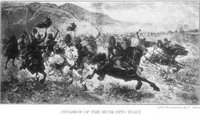 Lev wrote this in 1902. I wonder what he meant by the word "communication," or if that is even the exact word he used in Russian. I pass along the quote because it has always made me think about the complexity of our relationships with each other. And, to put it simply, it seems like a good starting point.
Lev wrote this in 1902. I wonder what he meant by the word "communication," or if that is even the exact word he used in Russian. I pass along the quote because it has always made me think about the complexity of our relationships with each other. And, to put it simply, it seems like a good starting point.
Subscribe to:
Posts (Atom)




